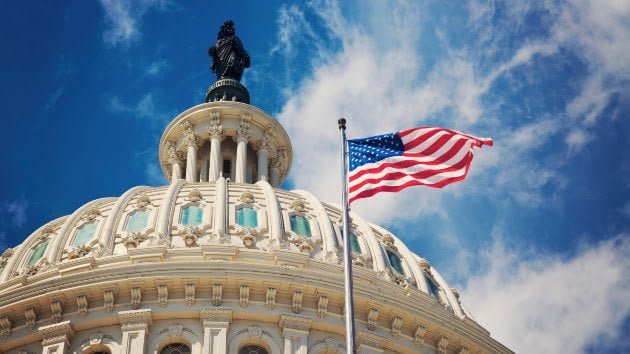(WASHINGTON) — After months of back and forth, House Republicans and the White House this weekend unveiled a deal on raising the nation’s $31.4 trillion borrowing limit while implementing some caps on government spending and other policy changes.
The legislation, which was released publicly on Sunday, will need to be approved by Congress within days to avert a historic default that could begin as soon as June 5, Treasury Secretary Janet Yellen has said.
Otherwise the U.S. will be unable to pay all of its bills — sowing unprecedented economic turmoil, including lost jobs and major hits to stock markets.
President Joe Biden has vowed to sign the debt deal if it passes the House and Senate. A House vote is slated for Wednesday.
Below are key takeaways and questions about the debt and spending bill:
What’s in the debt ceiling bill?
The agreement is a two-year budget deal that would also separately raise the debt limit for two years while keeping non-defense spending roughly flat with current levels in fiscal year 2024 and increasing by 1% in 2025. The newly reached agreement would suspend the debt limit through January 1, 2025 – taking away the threat of default for a few years.
The new debt ceiling deal has no changes to Medicaid and fully funds medical care for veterans. However, there are new SNAP eligibility requirements, such as placing time limits on certain Americans over the age of 54, according to sources from the White House.
Speaking about the agreement, a White House official said that President Biden and his team wanted to ensure that no one lost any health care in the agreement and that poverty would not increase as a result. When asked for an estimate on the net deficit reduction from the agreement, a White House official said discretionary savings are “likely” to be in the $1 trillion range, but would have to wait on the CBO score.
When does it have to pass?
Soon: While the treasury secretary has cautioned that estimates of the so-called “X-date” for default can vary, she most recently predicted the deadline to be June 5, “based on the most recent available data.”
Speaker Kevin McCarthy has said the House would vote on the bill on Wednesday. The Senate, which returns to Washington on Tuesday, would then begin processing the legislation on Wednesday night, Majority Leader Chuck Schumer told Democrats in a letter.
But under the chamber’s rules, it would only take one lawmaker to possibly delay approval for up to a week — past the X-date. Sen. Mike Lee, R-Utah, has threatened just that unless he feels the deal has “substantial spending and budgetary reforms.”
Schumer appeared to reference such obstacles in his letter to Democrats: “Due to the time it may take to process the legislation in the Senate without cooperation, Senators should prepare for potential Friday and weekend votes.”
Will the debt ceiling bill pass?
McCarthy and President Joe Biden think so, with McCarthy predicting on Sunday that both a majority of his conference and some Democrats would come together to approve the legislation.
The bill “doesn’t get everything everybody wanted,” he acknowledged, “but that’s, in divided government, that’s what we end up with.”
“This is a good, strong bill that a majority of Republicans will vote for,” he told ABC News’ Trish Turner.
And with Biden’s backing, “I expect his party to be supportive as well,” McCarthy said.
House Minority Leader Hakeem Jeffries confirmed during an appearance on CBS’ Face the Nation that Democrats will likely vote for the bill. But he didn’t offer specific estimates.
“I do hope and expect to see a significant number of House Republicans voting for this agreement. It’s my understanding that they are committed to producing at least 150 votes, if not more,” Jeffries said. “They were the ones who negotiated this agreement with the White House. And I expect that they will provide a significant number of votes to get it over the finish line.”
Republican Rep. Dusty Johnson of South Dakota said on Sunday that the more votes they are able to whip — from both sides — the better it looks for the nation.
“I think it is certainly plausible that we could get 218 [votes], although I think it’s going to look a lot better for this country if we can put a big number up on the board,” he said on CNN’s State of the Union. “Democrats like Joe Biden and some in the House coming together with Republicans to pass this.”
Outreach and whipping efforts for lawmakers on both sides of the aisle have been underway since the deal was first announced Saturday night, sources familiar have told ABC News.
In a statement on Saturday, Biden said, “I strongly urge both chambers to pass the agreement right away.”
Returning to the White House on Sunday, Biden was asked by ABC News’ Elizabeth Schulze: “Are you confident this deal will get to your desk?”
“Yes,” he said.
Political reactions
Biden and McCarthy stressed their deal as a compromise reflecting the bipartisan reality of Washington right now, but both some liberals and hard-line conservatives reacted with dismay — having urged their respective leaders, throughout negotiations, not to cede too much.
“This ‘deal’ is insanity. … Not gonna vote to bankrupt our country. The American people deserve better,” Rep. Ralph Norman, R-S.C. and a member of the House Freedom Caucus, tweeted.
Rep. Chip Roy, R-Texas and another member of the House Freedom Caucus, was more blunt, tweeting that the bill was a “turd-sandwich.”
Rep. Johnson said on “State of the Union” that despite the criticism, he thinks at least some of those “House Freedom people” will vote for a “fantastic deal.”
He shrugged off resistance from others.
“Let’s be honest, [Rep.] Bob Good will not vote for this thing. And it doesn’t matter if Mother Teresa came back from the dead and called him, he’s not voting for it. He was never going to,” Johnson said.
Across the aisle, Democratic Rep. Pramila Jayapal of Washington, the Progressive Caucus chair, declined to say if she would support the legislation either — and that congressional leaders should “worry” about garnering enough support from progressives like her.
In particular, more left-wing Democrats have criticized Biden for negotiating under the threat of default while agreeing to some work requirements on federal aid.
What are the risks of default?
Economists have warned the U.S. being unable to fulfill financial obligations would put millions of jobs at risk, increase unemployment levels and lead to higher prices for everyday items.
A default could also result in Social Security, Medicare and Medicaid payments — as well as military pay and veterans benefits — going unpaid or being delayed.
As the negotiations came down to the wire, Americans who depend on those checks expressed growing concern and anxiety surrounding their ability to pay rent, buy groceries and other daily expenses if default were to occur.
Air Force veteran Jacob Thomas in Minneapolis told ABC News’ Elizabeth Schulze the uncertainty over default was already hitting American military families.
“Even if a deal is reached, everything winds up being OK next week, that still means that right now, families and veterans across the country are having to think about, ‘What does it mean for me to have to ration my current paycheck or my current disability paycheck?"” Thomas said.
Fred Gurner, 86, of New York, told ABC News that he uses his Social Security payment for his $800 rent.
“It’s very stressful, gives me a heart attack,” Gurner said about how the issue has become politicized.
And Susan Prahl Meachum, a 64 year old living in rural Virginia, said she will “lose everything” if there is no deal to raise the debt limit in time.
“We’re human beings,” she said, “and we’re doing the best we can with what we’ve got.”
ABC News’ Chris Boccia, Adam Carlson, Peter Charalambous, Katherine Faulders, Alexandra Hutzler, Amanda Maile, Molly Nagle, Elizabeth Schulze, Rachel Scott and Trish Turner contributed to this report.
Copyright © 2023, ABC Audio. All rights reserved.





